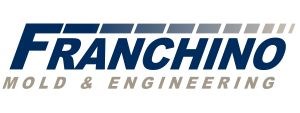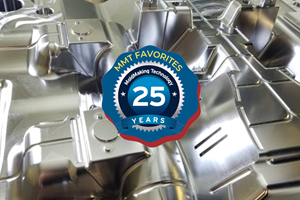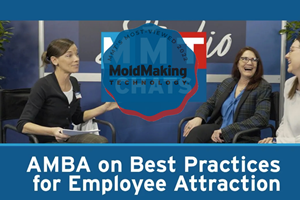Revamped Staffing Plan Doubles Franchino Mold Team
This builder of injection molds and die cast dies has doubled the number of its employees over the last eight years, boasts an average age of 44 and has 18 apprentices.
How does Franchino Mold and Engineering (Franchino Mold) find and attract the next generation of moldmaking professionals?
Brad Rusthoven, human resources manager: We have partnered with public schools and Michigan’s vocational education program since 1962 to hire and provide training for qualified employees. When I was hired in 2010, the apprentice program had lapsed because of the slow economy, so that was one of my first directives—to get it going again. First, we re-registered our moldmaker and CNC machining apprenticeship programs with the U.S. Department of Labor. Then we went back to using the curriculum we previously followed with Lansing Community College (LCC).
To attract new employees, we first tried hiring people “off the street,” meaning that we tried to find candidates who, without any background or foundational skills in manufacturing, at least had good attitudes, good work ethic and a willingness to show up on time and to learn the trade from our seasoned employees. That did not work as well as we had hoped, so we changed tactics. We contacted the four career centers located in the Lansing Metropolitan area because most high schools no longer offered shop classes. I connected with the people involved with the machining and engineering programs at those career centers and started to build relationships. I now serve on their advisory committees to help them develop their curricula. We host many tours with these career centers, and we attend their open houses and student showcases where participants or students in as early as eighth grade can walk through and see if anything appeals to them. The best part of these events is that usually the parents are with them, so we can speak with both about career opportunities in moldmaking. I am heavily involved with mock interviews and resume reviews at the career centers, too. As a result, we have a steady pipeline of candidates every year who are invited to come to Franchino Mold, test the waters and see if it is a fit for them.
I still sell potential candidates on the fact that Franchino Mold represents the true, skilled trades. I tell them that moldmaking is more unique than production machining. Everything is custom. They would be more than button-pushers because they would actually use their heads to program tool paths and set up jobs. We are looking for the right attitude and work ethic, good attendance and trainability, of course, but also good problem-solvers. We want apprentices to grow with us personally and professionally.
Once Franchino Mold recruits qualified apprentices, how does the company ensure that they learn required skills?
Rusthoven: A couple of years after we reestablished our apprenticeship programs, we found a private training institution on the west side of Michigan, Praeco Skills, that offered both moldmaking and CNC machining courses that an individual with a background in the tool and die industry developed. We switched to this program because these courses were very detailed and specific to this industry and were offered in multiple ways, including online, through live webinars and in on-site classes. In addition, there is a shopfloor course component where the apprentices can kill two birds with one stone—they can fulfill some of the curriculum requirements and the work hours while working on the shop floor.
The first-year apprenticeship classes are the same for everyone while they learn the fundamentals. We prefer to start them in the moldmaking department so that they see the end product versus working on machining specific details of components and wondering what their purpose is. They work with our journeymen moldmakers on mold repair, for example, and they get to disassemble molds and learn about all the components and their functions, the terminology and more. On a new mold, they learn to assemble all of those components. After about six months, it is not unusual to have at least one apprentice tell us he or she likes doing that work, and we will put them on the moldmaker career path, which will help them hone those skills. Others may say that they prefer the precision machining side, and we will send them down that career path. Our apprenticeship committee includes the moldmaking supervisor, the machining supervisor, the plant manager, the vice president of operations and me. We communicate very closely regarding any changes to the curriculum and related topics. We also use skill check sheets, one for each of the four years of the program, to track the apprentices’ progress on the aforementioned shopfloor courses. On each sheet, there is a list of skills and responsibilities that must be learned, and when the time is right, the apprentice, together with the journeyman moldmaker, signs off on each skill, indicating that the apprentice has acquired it sufficiently.
We still find a great deal of value in our connection with Lansing Community College, however. Several of our apprentices are taking courses at LCC and earning an associate degree in manufacturing engineering technology design or machining while they are earning their journeyman cards. This is covered under the company’s Educational Benefit Program and paid for as long as the students complete the courses and meet the minimum grade requirements for each class.
Regarding benefits, once an apprentice has achieved 90 days of employment he or she begins receiving the same full-time benefits that any employee would get, including medical insurance and a 401(k) plan. Our employee purchase program also kicks in at this time. Our employees call it the Tool Bill because it was historically used as an interest-free way for employees to purchase necessary tools for their jobs. We would pay for the tools and deduct a percentage of the cost out of their weekly paychecks. We have expanded that program to include other purchases, like laptop computers that they use for the online and live webinar components of the apprenticeship program.
When I was hired eight years ago, Franchino Mold only had around 40 employees. We have since more than doubled that number, plus we have 18 apprentices—to give a better perspective on recent growth. Seven of the apprentices are on the moldmaker path, and 11 are on the CNC precision machinist path.
Talk about Franchino Mold’s two rising stars who appeared in MoldMaking Technology’s first 30 Under 30 Feature.
Rusthoven: Chris Cook is the son of our plant manager, Al Cook. Chris came on board in 2014 and got right into the apprenticeship program. He has progressed quickly from a skills standpoint. A couple of years ago, Franchino Mold purchased an OMV Formula CNC Machine that’s a true, five-axis mill with three heads so we can do roughing and finishing work. Chris was the one who stepped up and learned to run it, plus he was helping to run other work centers. Now Chris is training someone else to run the machine while he is the team leader of the boring mill work center. It’s because of his own work ethic and leadership skills that he’s been able to move up so quickly.
Brandon Schafer joined Franchino Mold in 2012 and hit the ground running. He was in the middle of earning his associate degree at LCC for design, and we helped him finish his degree through our education benefit. He has progressed very, very quickly with all the design work that he is doing, but he also has turned into the “IT guy” in the design and engineering department. He has shown that he has leadership qualities and a good work ethic as well. That is what we are seeking.
Related Content
How to Improve Your Current Efficiency Rate
An alternative approach to taking on more EDM-intensive work when technology and personnel investment is not an option.
Read MoreMaking Quick and Easy Kaizen Work for Your Shop
Within each person is unlimited creative potential to improve shop operations.
Read MoreLeading Mold Manufacturers Share Best Practices for Improving Efficiency
Precise Tooling Solutions, X-Cell Tool and Mold, M&M Tool and Mold, Ameritech Die & Mold, and Cavalier Tool & Manufacturing, sit down for a fast-paced Q&A focused on strategies for improving efficiencies across their operations.
Read MoreMMT Chats: American Mold Builders Association on Best Practices for Employee Attraction and Hiring
MoldMaking Technology Editorial Director Christina Fuges sits down with AMBA’s Managing Director Kym Conis and the Director of Strategic Execution Rachael Pfenninger to discuss its Employee Attraction and Hiring Playbook and the Workforce Development Task Force. This episode is brought to you by ISCAR with New Ideas for Machining Intelligently.
Read MoreRead Next
Reasons to Use Fiber Lasers for Mold Cleaning
Fiber lasers offer a simplicity, speed, control and portability, minimizing mold cleaning risks.
Read MoreHow to Use Strategic Planning Tools, Data to Manage the Human Side of Business
Q&A with Marion Wells, MMT EAB member and founder of Human Asset Management.
Read MoreAre You a Moldmaker Considering 3D Printing? Consider the 3D Printing Workshop at NPE2024
Presentations will cover 3D printing for mold tooling, material innovation, product development, bridge production and full-scale, high-volume additive manufacturing.
Read More






















